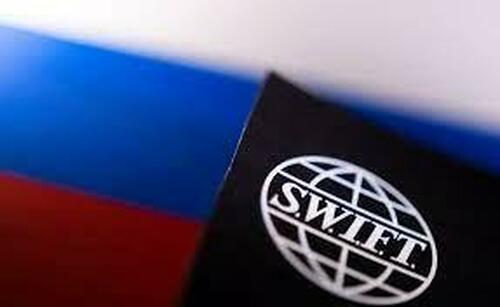The Impact Of A SWIFT Ban On Russia And The World
SWIFT (Society for Worldwide Interbank Financial Telecommunication) is the global financial system that allows immediate and secure transfers of money across borders. It is the web that verifies all financial transactions. It links 11,000 banks and institutions in more than 200 countries, with 40 million messages a day. Using SWIFT ensures that transactions happen in seconds in a secure way. Around 1% of those messages involve Russian payments, according to the BBC.
As part of the West sanctions against Russia, its banks have been banned from the SWIFT system. Additionally, the United States and the European Union have announced restrictions on the Russian central bank that block access to more than $600 billion in reserves. The Bank of Russia reports that only 22% of its international reserves are US Dollars, while gold accounts for 23%.
What does this mean? On the one hand, the move aims to block all options of the central bank to defend its currency from plummeting even more against the US dollar or the euro. In recent years, the Russian central bank has been reducing its exposure to US treasuries and shifting from US dollar reserves to euro and yuan, as well as gold. Access to those reserves is more difficult now, and in the case of euro and yen, probably close to impossible.
For Russian banks, the ban from the SWIFT system increases the risk of a bank run as citizens fear for the loss of their deposits and a collapse in daily operations, even if they start to use other alternatives.
However, we cannot forget there is an important impact on European banks as well. According to JP Morgan, European banks have up to $80 billion in claims with Russian banks. Being banned from SWIFT does not make these claims disappear, but if Russian banks fall into a de-capitalization process, the risks of defaults multiply.
Only three countries have been banned from SWIFT. Iran, since 2012, North Korea and now Russia, albeit partially. Oil and gas exports as well as other key commodities remain in the system.
Without SWIFT, Russian banks and the central bank are effectively blocked from operating on a global scale which means an added risk of a domino of defaults from issuers and the impossibility to conduct the most basic international operations.
However, Russian banks may bypass the SWIFT system and use other alternatives, mainly though a parallel system in China, called CIPS (Cross-Border Interbank Payments System), which facilitates transactions in yuan. According to CIPS, at least 25 Russian banks conduct yuan transactions through their system.
Using CIPS and other direct or indirect tools to bypass SWIFT has been an alternative for Iran and North Korea but does not solve the problem of access to reserves of the central bank nor does it truly mitigate the impossibility of conducting global transactions. The yuan is only used in 4% of global currency transactions according to the BIS (Bank Of International Settlements).
Russian banks and the central bank may moderate the financial blow using alternative systems, but the negative impact cannot be underestimated.
There may be a backlash for the United States as well. If other countries find that there is a valid alternative to SWIFT, they might feel compelled to strengthen ties with China.
Banning Russian banks from SWIFT may cripple many Latin American and Middle East economies that have deep financial connections with Russia, but there is a risk for the United States that the CIPS alternative, which is marginal at best today, grows rapidly.
The United States and Europe cannot fully ban SWIFT due to the importance of Russian oil, gas, metals, and wheat exports, and this may create numerous challenges that significantly limit the so-called “nuclear option”. The Russian central bank’s large gold reserves are also a differentiating factor compared to other economies.
No matter how we look at these sanctions, there is no doubt that there are unintended cross-border impacts and there may be unexpected negative consequences for everyone involved.
There is no doubt that the SWIFT ban is probably the most severe of financial sanctions possible and that there are no easy alternatives, but as time passes it is also clear that the widespread negative consequences of the Ukraine war will likely last for many years.
Will this measure accelerate a global financial shift toward China? Probably not in the short term, given the relatively modest use of the yuan compared to the importance of China in the global economy, but the ramifications of this measure in the global financial world are yet to be fully understood. A global financial transaction system remains as the undisputed leader only if it is truly global and far-reaching. The negative impact for Russia is unquestionable, but the long-term implications of this measure must be seen.
Tyler Durden
Mon, 02/28/2022 – 11:09
via ZeroHedge News https://ift.tt/lxQH5cF Tyler Durden
